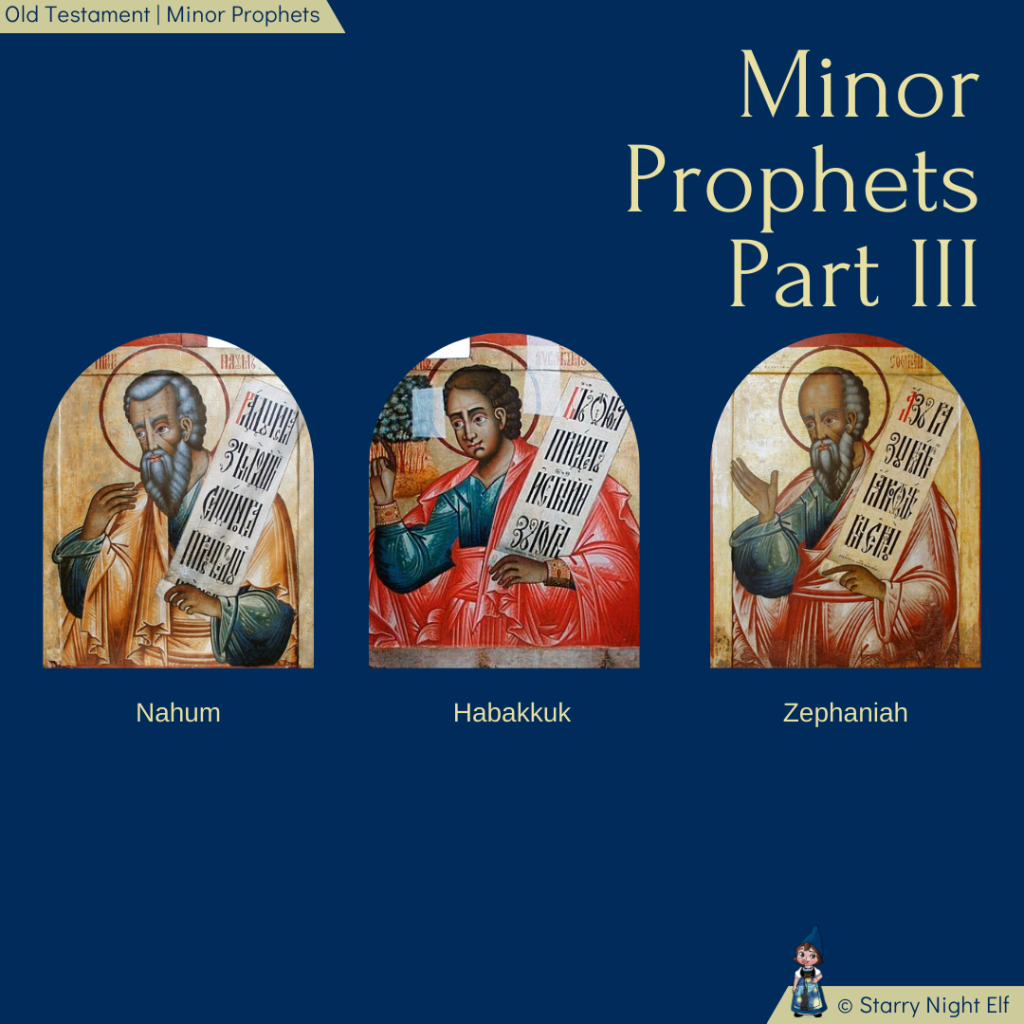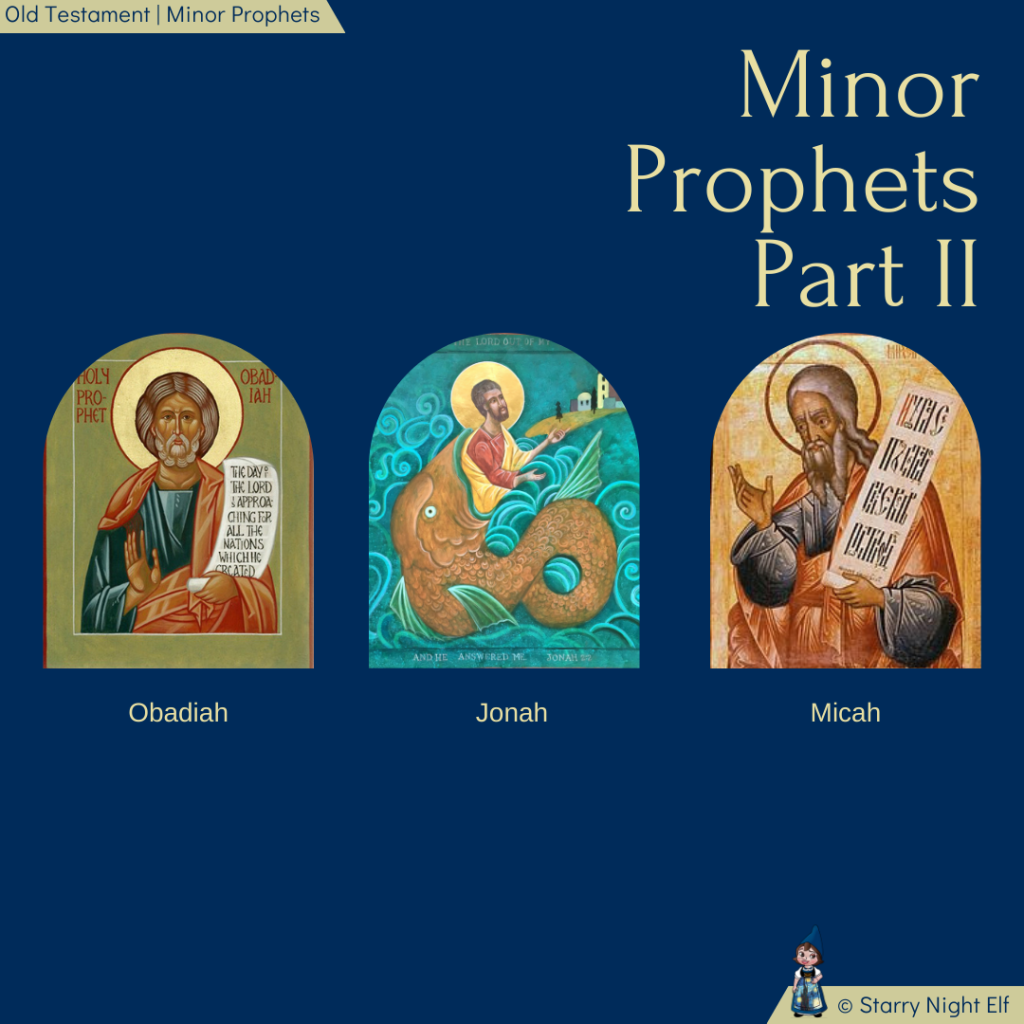
| © Starry Night Elf
Part of a series of Starlight Book Reviews (SBR) on Old Testament (OT) Books. Click here to see other OT SBR.
* The following post transparently exhibits my Christian faith.
5/5 In this Starlight Book Review (SBR), I look at the Minor Prophets/ Twelve Prophets Books of Nahum, Habakkuk, and Zephaniah.
Click here to check out the Sacred Texts Journey SRC.
The Minor Prophets or Twelve Prophets (Hebrew: שנים עשר, Shneim Asar; Imperial Aramaic: תרי עשר, Trei Asar, “Twelve”) (Ancient Greek: δωδεκαπρόφητον, “the Twelve Prophets”), occasionally Book of the Twelve, is a collection of prophetic books, written between about the 8th and 4th centuries BCE, which are in both the Jewish Tanakh and Christian Old Testament… In the Christian Old Testament, the collection appears as twelve individual books, one for each of the prophets: the Book of Hosea, Joel, Amos, Obadiah, Jonah, Micah, Nahum, Habakkuk, Zephaniah, Haggai, Zechariah, and Malachi. Their order, and position in the Old Testament, varies slightly between the Protestant, Catholic and Eastern Orthodox Bibles.
“The Book of Nahum is the seventh book of the 12 minor prophets of the Hebrew Bible. It is attributed to the prophet Nahum, and was probably written in Jerusalem in the 7th century BC… The subject of Nahum’s prophecy is the approaching complete and final destruction of Nineveh which was the capital of the great and flourishing Assyrian empire, at that time. Ashurbanipal was at the height of his glory. Nineveh was a city of vast extent, and was then the center of the civilization and commerce of the world, according to Nahum a “bloody city all full of lies and robbery”, a reference to the Neo-Assyrian Empire’s military campaigns and demand of tribute and plunder from conquered cities.”
“The Book of Habakkuk is the eighth book of the 12 minor prophets of the Bible. It is attributed to the prophet Habakkuk, and was probably composed in the late 7th century BC. The original text was written in the Hebrew language… Of the three chapters in the book, the first two are a dialogue between Yahweh and the prophet. The message that “the just shall live by his faith” plays an important role in Christian thought. It is used in the Epistle to the Romans, Epistle to the Galatians, and the Epistle to the Hebrews as the starting point of the concept of faith. A copy of these chapters is included in the Habakkuk Commentary, found among the Dead Sea Scrolls. Chapter 3 is now recognized as a liturgical piece. It is debated whether chapter 3 and the first two chapters were written by the same author.”
“The Book of Zephaniah (Hebrew: צְפַנְיָה, Ṣəfanyā; sometimes Latinized as Sophonias) is the ninth of the Twelve Minor Prophets of the Old Testament and Tanakh, preceded by the Book of Habakkuk and followed by the Book of Haggai. Zephaniah means “Yahweh has hidden/protected,” or “Yahweh hides”. Zephaniah is also a male given name. The original text was written in Biblical Hebrew.”
With my eighth reading of these three books – Nahum, Habakkuk, and Zephaniah, what stood out most to me was God’s love. Each of these tried to reach the people, to help return them to God. Below are verses which I found outstanding in my eighth reading in 2023.
These verses stood out to me:
7 The Lord is good,
Nahum 1:7 NIV
a refuge in times of trouble.
He cares for those who trust in him,
4 His splendor was like the sunrise;
Habakkuk 3:4
rays flashed from his hand,
where his power was hidden.
17 The Lord your God is with you,
Zephaniah 3:14 NIV
the Mighty Warrior who saves.
He will take great delight in you;
in his love he will no longer rebuke you,
but will rejoice over you with singing.”
Select Bibliography (Alphabetical Order by Author’s Surname)
- Carson, D. A.; Hess, Richard S.; Alexander, T. D.; Moo, Douglas J.; Naselli, Andrew David, eds. (2015). NIV Zondervan Study Bible. Grand Rapids: Zondervan. ISBN 978-0-31043833-5.
- “The Chronology of Biblical Prophets”, Adapted from Hauer, C.E. & Young, W. A., An Introduction to the Bible: A Journey into Three Worlds, p.123, Englewood Cliffs, NJ: Prentice-Hall, 1994.
- Cross, F. L. & Livingston, E. A., eds. (2005). The Oxford Dictionary of the Christian Church (3rd ed.). New York: Oxford University Press. ISBN 0-19-280290-9.
- Grudem, Wayne; Dennis, Lane T.; Packer, J. I.; Collins, C. John; Schreiner, Thomas R.; Taylor, Justin, eds. (2008). ESV Study Bible. Wheaton: Crossway. ISBN 978-1-43350241-5.
- Josephus, Flavius (1958). Vol. VI: Jewish Antiquities, Books IX–XI. Loeb Classical Library. Vol. 326. Translated by Marcus, William. London: William Heinemann. pp. 125–129, XI.xi.2–3.
- Kent H. Richards, Nahum Introduction: The Harper Collins Study Bible, (New York: Harper Collins, 2006) 1250.
- Nahum, Habakkuk and Zephaniah. Downers Grove, IL: InterVarsity Press. p. 18. ISBN 978-0-8308-9482-6.

